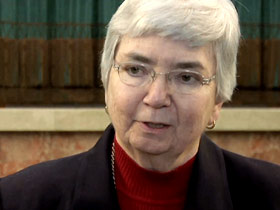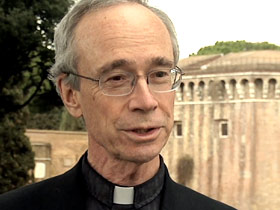In This Episode << SLIDE LEFT TO SEE ADDITIONAL SEGMENTS
Selecting a New Pope: Conclave Preview
KIM LAWTON, correspondent: Since Monday, the cardinals have been gathering for a series of meetings—what they call “congregations”—to discuss the future of the Catholic Church.
REV. THOMAS REESE, S.J. (National Catholic Reporter): That’s where they meet and have speeches, listen to each other, do some logistical planning for the conclave. Some of it’s very boring. But the important part that they do there was actually talk about some of the issues that face the church and what they think is needed.
LAWTON: Father Thomas Reese is doing analysis of the papal transition for National Catholic Reporter. He says the cardinals’ most essential work this week took place outside the meetings.
REESE: Over the coffee breaks, over dinner and lunch where the cardinals have a chance to talk to one another, get to know one another, asking them, you know, what do you think are the issues facing the church, who do you think would be a good pope?
LAWTON: Many cardinals said they didn’t want to be pressured to begin the conclave too quickly.

SISTER MARY ANN WALSH (US Conference of Catholic Bishops): Well, this is a huge moment. Leadership comes from the top and you’re electing the top leader, the man who’s going to set the tone for the church. That’s very important.
LAWTON: There was controversy after some Italian media leaked detailed accounts of the cardinals’ meetings.
WALSH: That made them say, “What’s happened to the freedom to speak in the congregation? If you don’t have confidentiality, you don’t have freedom.” And so everybody took the position—it happened the last time too—well, we’d better just not give interviews at all. And so the cardinals agreed to that.
LAWTON: The media blackout meant that US cardinals had to stop holding their general media briefings.

REESE: The American cardinals of course came to Rome, and they wanted to do things just like they do in the United States, so they called press conferences to help the media do their stories, to feed some stories to the media because if you don’t feed the beast, it will devour you. So they were pretty smart, I thought, in having these stories. In other parts of the world, this just isn’t done, and in Rome, they don’t like this.
LAWTON: Some 5,000 journalists from around the world have sought media credentials to cover the transition. But the cardinals’ voting process for the new pope is supposed to take place under the strictest of secrecy.
REESE: When it comes to the conclave, they’re going to be actually locked up inside, no phones, no internet, no email, not even letters, so that’s going to be really isolating. Now once they come out, typically what happens is the stories start to leak out, about who was leading and how the votes went and we’ll probably find out that soon after the conclave is over.
LAWTON: People around the world are watching it all with a sense of keen anticipation.
WALSH: Somebody wrote me a note today saying they are praying for an inspired choice. I think everyone is.
LAWTON: Catholics believe the pope is part of an unbroken line of church leaders that stretches directly back to St. Peter. And despite the challenges, they say electing Peter’s successor is indeed a momentous occasion.
I’m Kim Lawton at the Vatican.

